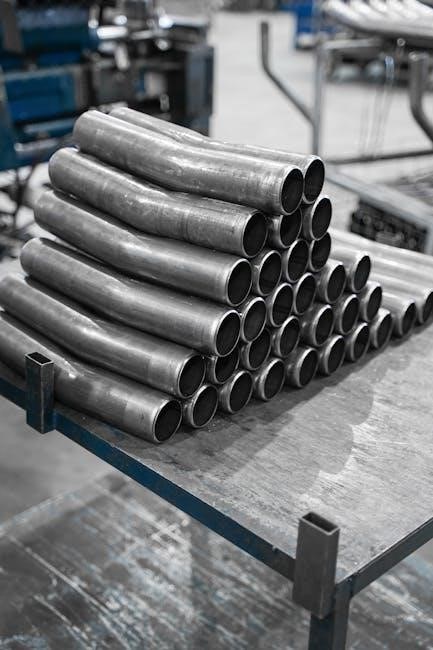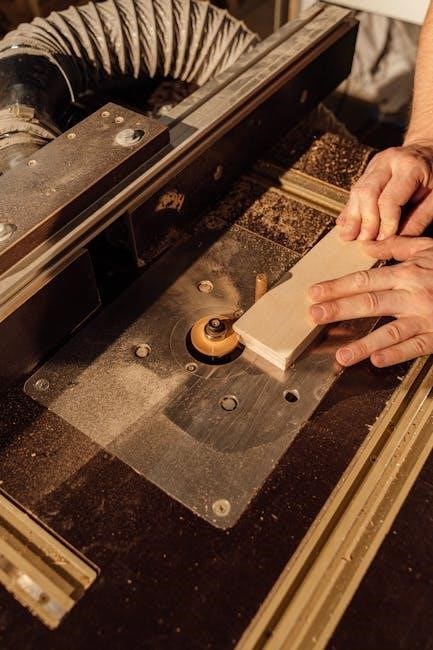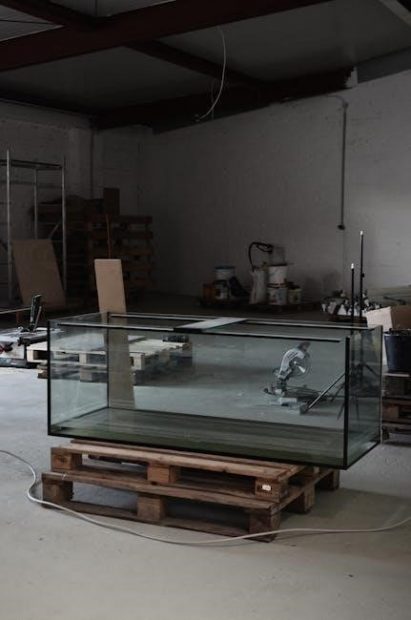Overview of “Manufacturing Processes for Engineering Materials 6th Edition”
The book Manufacturing Processes for Engineering Materials, 6th Edition, by Serope Kalpakjian and Steven R․ Schmid, provides a detailed exploration of modern manufacturing techniques and materials․ Updated with the latest technologies, it covers metal forming, casting, and advanced methods, offering clear insights for students and professionals․ The book includes practical applications and case studies, making it a vital resource in engineering education and industry․
Manufacturing Processes for Engineering Materials, 6th Edition, is authored by renowned experts Serope Kalpakjian and Steven R․ Schmid․ Kalpakjian, a distinguished professor, brings extensive knowledge in manufacturing and materials science, while Schmid, a recognized researcher, contributes expertise in mechanical engineering․ The book is tailored for students in mechanical, industrial, and materials engineering programs, offering a comprehensive understanding of manufacturing processes․ It bridges theoretical concepts with practical applications, making it a cornerstone in engineering education․ The authors’ collaborative effort ensures the content is both accessible and detailed, catering to both newcomers and seasoned professionals in the field․ This edition reflects their commitment to advancing engineering education through clear, concise, and cutting-edge content․
Key Features of the 6th Edition
The 6th Edition of Manufacturing Processes for Engineering Materials introduces several enhancements, including new chapters on advanced manufacturing technologies and sustainable practices․ It features updated case studies, practical examples, and enhanced visuals such as diagrams and illustrations to improve understanding․ The edition incorporates the latest developments in Industry 4․0 and digital manufacturing, ensuring relevance to modern engineering challenges․ Additionally, it offers expanded coverage of materials science, including polymers, composites, and smart materials․ The book also includes supplementary resources, such as online tutorials and problem-solving sets, to aid both students and instructors․ These updates make the 6th Edition a comprehensive and indispensable resource for engineering education and professional development․
- New chapters on advanced manufacturing and sustainability․
- Updated case studies and practical examples․
- Enhanced visuals and illustrations․
- Coverage of Industry 4․0 and digital manufacturing․
- Supplementary online resources․

Manufacturing Processes for Engineering Materials
The 6th Edition covers essential manufacturing processes, including metal forming, casting, and advanced technologies, providing a foundational understanding of materials and their production methods․
Metal Forming Techniques
Metal forming techniques are extensively covered in the 6th Edition, detailing processes like forging, rolling, extrusion, and sheet metal forming․ These methods shape metals without removing material, emphasizing plastic deformation․ The book explains how each technique affects material properties and mechanical behavior, providing insights into tool design and process optimization․ Practical examples and case studies illustrate real-world applications, making it invaluable for engineering students and professionals․ Advanced topics, such as hot and cold working, are also explored to enhance understanding of modern manufacturing practices․
Casting and Foundry Processes
The 6th Edition delves into casting and foundry processes, detailing various methods such as sand casting, investment casting, and die casting․ It explores the fundamentals of mold design, material selection, and process optimization․ The book highlights recent advancements in casting technologies, including automation and 3D printing in foundries․ Emphasis is placed on defect prevention and quality control, ensuring high-integrity products․ Practical applications and case studies demonstrate the importance of these processes in manufacturing․ The chapter serves as a comprehensive guide for understanding both traditional and modern casting techniques, making it essential for engineering students and professionals involved in materials production․
Advanced Manufacturing Technologies
The 6th Edition extensively covers advanced manufacturing technologies, emphasizing their role in modern engineering․ Topics include automation, robotics, and additive manufacturing, such as 3D printing and rapid prototyping․ The book explores computer-aided design (CAD) and computer-aided manufacturing (CAM), highlighting their integration with CNC machining․ Advances in precision engineering and smart manufacturing are also discussed, focusing on Industry 4․0 and the Internet of Things (IoT)․ These technologies enable faster production, higher accuracy, and reduced material waste․ The chapter provides insights into the future of manufacturing, showcasing how these innovations improve efficiency and sustainability․ Practical examples and case studies illustrate the implementation of these technologies in real-world scenarios, making this section invaluable for understanding cutting-edge production methods in engineering․

Engineering Materials and Their Applications
The 6th Edition explores a wide range of engineering materials, including metals, alloys, polymers, and composites․ It discusses their unique properties and applications in various industries, such as automotive and aerospace, emphasizing material selection for optimal performance and sustainability․
Metals and Alloys in Manufacturing
The 6th Edition extensively covers the role of metals and alloys in manufacturing, detailing their properties, applications, and processing techniques․ It explores ferrous and non-ferrous metals, such as steel, aluminum, and titanium, highlighting their strength, durability, and corrosion resistance․ The book also discusses advanced alloy developments, including high-temperature alloys for aerospace and lightweight alloys for automotive industries․ Modern manufacturing techniques like casting, forging, and additive manufacturing are explained, emphasizing how these processes shape metals into functional components; The section also addresses challenges like material wastage and recycling, providing insights into sustainable metal manufacturing practices․ This comprehensive coverage makes it an essential resource for understanding the critical role of metals and alloys in contemporary engineering and manufacturing․
Polymers and Composite Materials
The 6th Edition dedicates a significant portion to polymers and composite materials, highlighting their growing importance in modern manufacturing․ Polymers, such as thermoplastics and thermosets, are discussed in detail, emphasizing their lightweight, corrosion-resistant, and versatile properties․ The book explores their applications in industries like aerospace, automotive, and consumer goods․ Composite materials, including fiber-reinforced polymers, are also covered, showcasing their high strength-to-weight ratios and durability․ Manufacturing techniques such as injection molding, extrusion, and composite layup are explained, along with advancements in nanocomposites and biodegradable polymers․ The section underscores the environmental benefits of these materials, such as reduced weight and energy consumption, making them critical for sustainable manufacturing practices․ This comprehensive overview equips readers with a deep understanding of polymer and composite material technologies․
Importance of the 6th Edition in Modern Engineering
The 6th Edition of Manufacturing Processes for Engineering Materials holds significant relevance in modern engineering due to its updated content and focus on cutting-edge technologies․ It bridges the gap between traditional and advanced manufacturing methods, providing insights into sustainable and efficient production processes․ The book addresses global engineering challenges, such as material optimization and environmental sustainability, making it a critical resource for both academia and industry․ Its comprehensive coverage of modern techniques ensures that engineers are well-prepared to meet the demands of a rapidly evolving field․ By integrating practical applications and case studies, the 6th Edition remains indispensable for professionals seeking to innovate and improve manufacturing practices worldwide․
Educational Significance and Target Audience
The 6th Edition of Manufacturing Processes for Engineering Materials is a cornerstone in engineering education, primarily targeting students in mechanical, industrial, and materials engineering programs․ Its comprehensive coverage of manufacturing techniques and materials science makes it an essential textbook for undergraduate and graduate studies․ The book is also a valuable resource for professionals seeking to update their knowledge of modern manufacturing practices․ By integrating theoretical concepts with practical applications, it serves as a bridge between classroom learning and real-world engineering challenges․ Educators worldwide incorporate this text into their curricula due to its clarity, depth, and relevance to contemporary engineering needs․ Its accessibility ensures that both novices and experienced engineers can benefit from its detailed insights․

Supplementary Resources and Solution Manuals
Supplementary resources for the 6th Edition of Manufacturing Processes for Engineering Materials enhance learning and problem-solving․ The solution manual, available in PDF format, provides detailed answers to textbook problems, aiding students in understanding complex concepts․ Additional resources include online tutorials, lecture slides, and case studies that complement the book’s content․ Many of these materials are accessible through educational platforms, forums, and the publisher’s website․ Students and instructors can also find shared resources on platforms like Reddit and academic forums․ These supplementary tools are designed to deepen comprehension of manufacturing processes and materials, making them invaluable for both individual study and classroom instruction․ They ensure that learners can grasp and apply the principles effectively, bridging theory and practice․

Downloading the PDF and Availability
The PDF of Manufacturing Processes for Engineering Materials, 6th Edition is widely available for download through various online platforms․ Officially, it can be purchased from the publisher’s website or through authorized retailers․ Additionally, many academic forums, educational websites, and file-sharing platforms offer free or paid access to the PDF version․ Students and professionals often share links on platforms like Reddit or specialized engineering forums․ The 6th Edition is also available in regional adaptations, such as the Global Edition, ensuring accessibility worldwide․ Digital formats allow for easy access and portability, making it convenient for learners to study on multiple devices․ However, users should ensure they are downloading from reliable sources to avoid unauthorized or incomplete versions․ The PDF format retains the book’s original formatting, providing a seamless reading experience․
